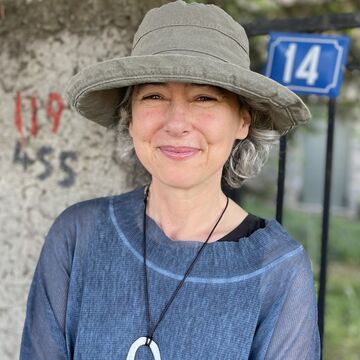| Top:Wandering Uterus |
Visual and Critical Studies |
3001 (002) |
Spring 2024 |
|
Description
This interdisciplinary course approaches the topic of gender, race, and medicine from cultural, historical, and scientific perspectives. We consider hysteria (purported to be caused by a 'wandering uterus') and other mental afflictions associated with sex and gender, the foundation of U.S. gynecology and its dependence on enslaved bodies, the Women's Health Movement and its legacy, queer and trans health issues, and sex health education. Readings include works by Audre Lourde, Charlotte Perkins Gilman, Elaine Showalter, Leslie Feinberg and Andrea Smith. We will also consider the ways in which artists have addressed issues of gender, race and medicine in their work. Assignments include an interview project, written reflections, and a final research-based project.
|
Class Number
1539
Credits
3
|
| Wandering Uterus: Journeys through Gender and Medicine |
Liberal Arts |
3532 (001) |
Spring 2024 |
|
Description
This interdisciplinary course approaches the topic of gender, race, and medicine from cultural, historical, and scientific perspectives. We consider hysteria (purported to be caused by a 'wandering uterus') and other mental afflictions associated with sex and gender, the foundation of U.S. gynecology and its dependence on enslaved bodies, the Women's Health Movement and its legacy, queer and trans health issues, and sex health education. Readings include works by Audre Lourde, Charlotte Perkins Gilman, Elaine Showalter, Leslie Feinberg and Andrea Smith. We will also consider the ways in which artists have addressed issues of gender, race and medicine in their work. Assignments include an interview project, written reflections, and a final research-based project.
|
Class Number
1605
Credits
3
|
| UG Thesis: Research and Writing I |
Liberal Arts |
4800 (001) |
Fall 2024 |
|
Description
This course enables upper-level students to develop a well-researched thesis project on a topic of their choice. Such a thesis project may be linked to their final BFA thesis or studio project, and may be useful for students considering graduate school in a field in which research and writing expertise is required. Students may choose to enlist innovative formats and incorporate a variety of media. Topics as diverse as 'Gay Cinema,' 'Culture as Industry,' 'Is Rap Subversive?,' 'The Art and Science of Fragrance,' and 'The Morphology of the Toy Soldier Body' have been explored. Class meetings are used to share research methods, discuss the given challenges of various projects, and present works-in-progress for critique.
|
Class Number
1675
Credits
3
|
| Undergraduate Thesis |
Visual and Critical Studies |
4800 (001) |
Fall 2024 |
|
Description
This course enables upper-level students to develop a well-researched thesis project on a topic of their choice. Such a thesis project may be linked to their final BFA thesis or studio project, and may be useful for students considering graduate school in a field in which research and writing expertise is required. Students may choose to enlist innovative formats and incorporate a variety of media. Topics as diverse as 'Gay Cinema,' 'Culture as Industry,' 'Is Rap Subversive?,' 'The Art and Science of Fragrance,' and 'The Morphology of the Toy Soldier Body' have been explored. Class meetings are used to share research methods, discuss the given challenges of various projects, and present works-in-progress for critique.
|
Class Number
1026
Credits
3
|
| Graduate Studio Seminar |
Masters in Fine Arts Low Residency |
5600 (005) |
Summer 2024 |
|
Description
This seminar consists of weekly lectures, colloquia, and studio visits. Students are expected to arrive with completed and semi-completed works and be prepared to make and re-make new works throughout the summer sessions. A wide variety of readings chosen by faculty will guide discussions that concentrate on problems concerning methods of artmaking, distribution, and interpretation. Readings will include examples drawn from the emerging category of conceptual writing as well as crucial art historical texts, literature, and poetry.
|
Class Number
1211
Credits
4.5
|
| Graduate Projects: Interdisciplinary |
Masters in Fine Arts |
6009 (048) |
Spring 2024 |
|
Description
Taken every semester, the Graduate Projects courses allow students to focus in private sessions on the development of their work. Students register for 6 hours of Graduate Project credit in each semester of study.
|
Class Number
1324
Credits
3 - 6
|
| Graduate Projects: Interdisciplinary |
Masters in Fine Arts |
6009 (156) |
Fall 2024 |
|
Description
Taken every semester, the Graduate Projects courses allow students to focus in private sessions on the development of their work. Students register for 6 hours of Graduate Project credit in each semester of study.
|
Class Number
1769
Credits
3
|
| Thesis II |
Arts Administration and Policy |
6095 (003) |
Spring 2024 |
|
Description
A master's thesis is required for completion of the master's degree in arts administration. The thesis should demonstrate a student's ability to design, justify, execute, evaluate, and present the results of original research or of a substantial project. In this class students work closely with an MAAAP program advisor, and meet frequently with other MAAAP participants in groups and in individual meetings. The thesis is presented, in both written and oral form, to a thesis committee for both initial and final approval. You must be a Master of Arts in Arts Administration and Policy student to enroll in this course.
|
Class Number
2516
Credits
3
|

